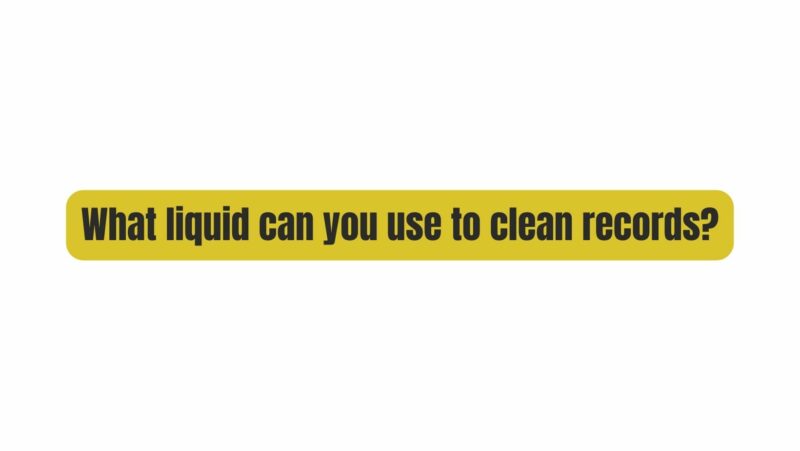Vinyl records have been making a comeback in recent years, with audiophiles and music enthusiasts appreciating the warmth and authenticity of analog sound. However, to fully enjoy the music stored on these vinyl grooves, proper maintenance and cleaning are essential. Dust, dirt, and even microscopic particles can accumulate on the surface of records, affecting the quality of the playback. In this article, we will delve into the world of vinyl record cleaning and explore the various liquids you can use to clean your cherished collection.
The Importance of Record Cleaning
Before delving into the specifics of record cleaning solutions, it’s crucial to understand why cleaning your vinyl records is essential. Records are sensitive to contaminants, and even minor particles can cause surface noise, pops, and clicks during playback. Regular cleaning not only improves the sound quality but also extends the life of your records.
- Dust and Debris Removal: Records are magnets for dust and debris. Even if you store them in protective sleeves, they can still accumulate particles over time. Cleaning helps remove these nuisances, resulting in a cleaner, quieter playback.
- Mold and Mildew Prevention: Improper storage conditions can lead to mold and mildew growth on records. Cleaning not only removes existing growth but also helps prevent its return.
- Surface Preservation: Records are delicate, and contaminants can cause groove wear and damage. Regular cleaning helps preserve the integrity of the vinyl surface, ensuring a longer lifespan for your records.
- Improved Sound Quality: The removal of contaminants and dirt from the grooves results in a clearer, more faithful reproduction of the music.
Choosing the Right Cleaning Solution
When it comes to cleaning vinyl records, choosing the right cleaning solution is paramount. The choice of liquid depends on various factors, including the level of contamination, your budget, and personal preferences. Here are some common record cleaning solutions:
- Distilled Water: Distilled water is the most basic and gentle cleaning solution. It’s suitable for light cleaning or for diluting more potent solutions. Make sure to use distilled water to avoid introducing impurities to your records.
- Isopropyl Alcohol (IPA): IPA is commonly used in record cleaning solutions due to its excellent cleaning properties and quick evaporation. However, it should be diluted with distilled water to avoid damaging the vinyl. A 70% IPA to 30% distilled water ratio is often recommended.
- Commercial Record Cleaning Fluids: Many companies produce specialized record cleaning fluids designed to remove dirt, dust, and static from vinyl records. These products are often safe for use and come with application instructions.
- Homemade Solutions: Some vinyl enthusiasts prefer homemade cleaning solutions. One popular recipe involves mixing distilled water, isopropyl alcohol, and a small amount of dish soap. However, homemade solutions should be used with caution, as improper mixing can damage records.
- Enzyme-based Cleaners: Enzyme-based cleaners are effective at removing organic contaminants, such as mold or mildew. They are less common but can be useful for heavily soiled records.
The Cleaning Process
Now that you have chosen your cleaning solution, it’s essential to understand the proper cleaning process. Here are step-by-step instructions for cleaning vinyl records:
- Gather Your Materials: You’ll need your dirty records, a cleaning brush (carbon fiber or velvet brushes are popular choices), a microfiber cloth, your chosen cleaning solution, and a record cleaning machine if available.
- Inspect the Record: Examine the record for visible dirt or contaminants. Use a brush to remove loose particles and debris. Be gentle to avoid scratching the surface.
- Apply Cleaning Solution: If using a commercial cleaning fluid or homemade solution, apply it to the surface of the record. Be cautious not to spill any solution on the record label.
- Clean with a Brush: Gently scrub the record’s grooves with a soft-bristle brush in a circular motion. This action helps dislodge dirt and grime from the grooves.
- Rinse or Wipe: Depending on the type of solution used, you may need to rinse the record with distilled water or wipe it with a damp, clean cloth to remove any residue. Ensure the record is completely dry before playing it.
- Storage: After cleaning, store the record in a clean, anti-static sleeve to prevent future contamination.
Conclusion
Cleaning vinyl records is an essential aspect of record maintenance, and choosing the right cleaning solution is crucial to preserve your collection’s sound quality and longevity. Whether you opt for distilled water, isopropyl alcohol, commercial cleaning fluids, or homemade solutions, the key is to be gentle and thorough in your cleaning process. With proper care, your vinyl records will continue to provide you with the rich, analog sound you love for years to come. So, go ahead, clean your records, and immerse yourself in the magic of vinyl!


